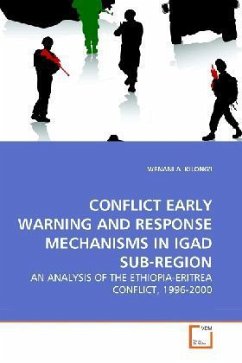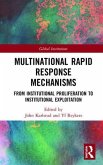This book interrogates the theoretical discourses on conflict early warning and early response, and delves into whether the existence of early warning system would have impaired or enhanced transformation of Ethiopia-Eritrea conflict. Indicators of potential conflicts are highlighted and explicated. To this extent, the book analyses retrospectively the role of early warning and response mechanisms in the prevention and management of conflict in the IGAD Sub-Region. The author contends that conflict preventive strategies are predicated on conflict information and structured on conflict cycle. Since numerous challenges face conflict prevention in Africa, understanding both structural and dynamic causes of conflict should inform effective conflict early warning systems. In this regard, information, resources, decision-making processes and political will are critical elements in effecting early response to conflict. This book is strongly recommended for scholars, university students,researchers and general readership.
Bitte wählen Sie Ihr Anliegen aus.
Rechnungen
Retourenschein anfordern
Bestellstatus
Storno








